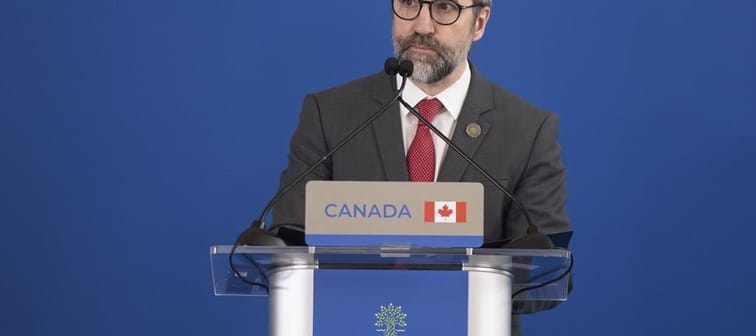But Steven Guilbeault said he can't predict where nations will land when they finalize the treaty in Korea this fall, or whether it will go far enough to address the concerns of developing nations.
"I believe that there are lots of things that we can find common ground on as part of this treaty," he said, including the elimination of single-use plastics, better labelling regulations and increased use of recycled materials.
Negotiators from 175 nations were in Ottawa for the last week to solidify some of the details of a global treaty intended to cut plastic waste.
The production of new plastic products remained a central point of contention throughout the talks, however.
On the final day of talks Monday, Rwanda and Peru asked countries to consider reducing new plastics production by 40 per cent by 2040, based on a 2025 benchmark.
Those were the same two countries that called for the treaty in the first place.
In 2020, Canada produced more than 7.1 million tonnes of plastic and only five per cent of it was recycled material. Almost five million tonnes of plastic ended up as waste, with less than 10 per cent of it recycled.
Almost one-third of Canadian plastic is made for packaging, and more than 40 per cent of plastic waste comes from packaging.
Greenpeace criticized Canada for allowing the talks to wrap Monday without establishing a clear path toward curbing the production of new plastic.
"Any child can see that we cannot solve the plastic crisis unless we stop making so much plastic," Graham Forbes, the head of the Greenpeace delegation to the talks, said in a statement.
The Centre for Biological Diversity blamed the division on Russia, China and Saudi Arabia, and said those three countries proposed amendments to the draft of the treaty that would "gut it almost entirely."
Guilbeault however lauded the progress made toward a binding treaty aimed at cutting plastic waste, with the final negotiations set for Korea in the late fall.
The countries agreed to continue less formal talks in the meantime, in the hopes of reaching an agreement during the next round of negotiations, but several countries opposed including plastic production in those discussions.
Members of the plastics industry said they were encouraged by the latest round of talks.
"Our industry is fully committed to a legally binding agreement all countries can join that ends plastic pollution without eliminating the massive societal benefits plastics provide for a healthier and more sustainable world," the Global Partners for Plastics Circularity said in a statement.
This report by The Canadian Press was first published April 30, 2024.
— With files from Mia Rabson
Sponsored
Trade Smarter, Today
With CIBC Investor's Edge, kick-start your portfolio with 100 free trades and up to $4,500 cash back.







